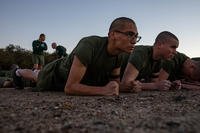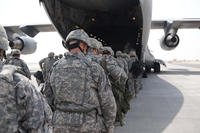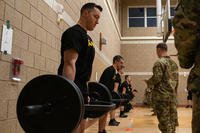CAMP BLANDING, Fla. -- "The Army Reserve is a great way to feed that itch," is how a former paratrooper from the 82nd Airborne Division describes his decision to return to service in the Army Reserve after a short break.
Spc. Michael Edwards, from Wesley Chapel, Florida, calls the transition "the best of both worlds." He is assigned to the 200th Military Police Command's 810th Military Police Company in Tampa.
According to the former active-duty soldier, "You have the opportunity to serve with the U.S. Army on a part-time basis while also going to school or fulfilling your role in society and in your community."
Edwards, a self-described late bloomer, said his military career started in 2007.
"I felt like I had something left on the table," he said. "I know people join the military when they are a lot younger, so I figured if I didn't join then, I probably never would."
After spending several years jumping out of military aircraft and deploying into harm's way, Edwards eventually came off active duty to complete his bachelor's degree. He is halfway through his master of business administration at Saint Leo University.
"I was able to complete four years of school in two years by using my G.I. Bill benefits with the Yellow Ribbon Program," he said. "After I finished my bachelor's degree, I switched my priorities and took on a full-time job, and now I go to school part time."
With that itch needing to be scratched, Edwards drove over to a nearby Reserve center to see what the Army Reserve had to offer.
"Now I am looking at the options to pick up another [military occupational specialty] as a military police soldier," he said.
Edwards works as a claims adjuster for an insurance company and has spent the past two weeks on annual training, developing new friendships and mentoring the Army Reserve's newest members.
"I love being with soldiers," he said while providing security for a medical evacuation helicopter on a landing zone. "I have a lot of experience to bring to the unit, and they have something to teach me as well."
Edwards encouraged others who have left or plan to leave active duty to consider service in the Army Reserve.
"I would definitely look into it," he said, adding that brotherhood and sisterhood in the military cannot be replicated in the civilian sector. "We all miss it eventually. We are all used to a certain way of life, and it's tough to find that in the civilian world. A lot of civilians can freak out or get upset over small things, but after one deployment, we have a different view in life and can handle confrontation or discomfort differently than those who have never served."
Sgt. Maj. Bennie Nunnally, the operations non-commissioned officer in charge for the 724th Military Police Battalion, based in Fort Lauderdale, said Edwards has been a great asset to the Army Reserve and Military Police Corps.
"He may think he's old, but his heart is young, and his passion for his country is indescribable," he said. "One day, he's going to be a command sergeant major for the Army Reserve. He has that drive and leadership qualities we, as senior leaders, dream to mentor."
Maj. Gen. Phillip Churn, the commanding general of the 200th MPCOM, said as the Army downsizes, the transition of active component soldiers into the Reserve components is a win for the total Army.
As the active component downsizes, Churn said the total Army will look to the Army Reserve to pick up missions previously handled by active-duty organizations.
Churn said a benefit to joining the Army Reserve is that it gives soldiers the opportunity to train in career fields not readily available on the active component and more compatible with private industry.
He said the Army Reserve not only would train soldiers in career fields more compatible with private industry, but it also will assist a soldier with finding a civilian job.
For Churn, a strong Army Reserve family is a key component to the success of a unit. The 200th MPCOM has more than 13,000 soldiers living in 44 states and said the No. 1 priority for any leader is taking care of the Army Reserve family before, during and after a deployment.
"Active-duty soldiers transitioning to the Reserves may keep their families grounded in local communities while still being a part of the total force," he said. "The private sector can leverage their leadership and technical skills they acquired while on active duty. It's a win for employers, the Army Reserve and their communities."
Whether attending college or beginning a new career, Churn said soldiers can move forward with confidence in the Army Reserve and create a strong future for themselves, their families and their communities.
Churn said as the Army reduces its forces, those active-duty soldiers would add significant value to the Army Reserve.
"Soldiers get to maintain that spirit of camaraderie that they experienced on active duty, and Soldiers often don't realize how much they will miss being around other soldiers," he said.
Coming from active duty to the Army Reserve is an avenue to continue their military careers and service to their country, he mentioned.
"It allows us to retain combat readiness that has been hard-earned over more than a decade of war," he said. "That experience is crucial as we face today's global threat environment."
Edwards, whose mother is from the Caribbean and father is from England, said the Army gave him an opportunity to become an American citizen in 2009.
"Today, I am living the American dream," he said. "Who could ask for anything more?''
Interested in Joining the Military?
We can put you in touch with recruiters from the different military branches. Learn about the benefits of serving your country, paying for school, military career paths, and more: sign up now and hear from a recruiter near you.















